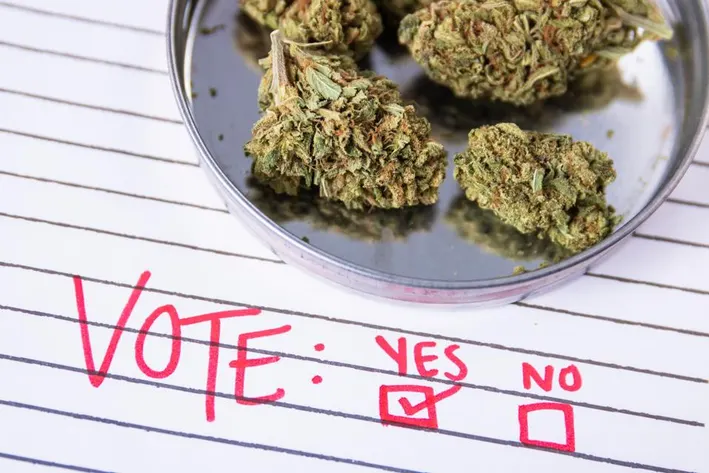With the state Supreme Court's recent ruling that the ballot reform measure can appear on the election ballot this year, there is serious concern that all that effort may have been in vain.

The back-and-forth battle between supporters of legal adult-use cannabis and those opposed to establishing a recreational marijuana market in Florida continues to play out following a ruling by the state's Supreme Court earlier this month allowing a controversial ballot initiative, making legal adult-use cannabis a permanent part of the Florida Constitution, to appear on this coming November's ballot.
The "Adult Personal Use of Marijuana" proposal, if approved by voters, would add an amendment to the Florida State Constitution allowing people 21 or older "to possess, purchase, or use marijuana products and marijuana accessories for non-medical personal consumption by smoking, ingestion, or otherwise."
Additionally, the measure would allow any of the current 22 medical marijuana companies in Florida to begin selling cannabis to all adults over the age of 21. It also contains a provision enabling lawmakers to take steps toward approving additional businesses as potential sellers but does not require it. Finally, the proposed amendment would prohibit individuals from growing cannabis plants for personal use.
On April 1, in a 5-2 decision, the state justices ruled that the proposed ballot measure "conforms" to state constitutional requirements. As part of their ruling, the justices wrote, "In light of those limited considerations, we approve the proposed amendment for placement on the ballot."
"In light of those limited considerations, we approve the proposed amendment for placement on the ballot."
- Florida Supreme Court Ruling on Cannabis Legalization Initiative
However, the court's ruling is just the first step in a long campaign process spearheaded by the "Smart & Safe Florida" political committee. The committee launched its effort to add the proposed reform measure to this year's ballot earlier last year. It has raised over $47 million to date, with most of the funding provided by the multi-state cannabis operator Trulieve ($40 million).
Despite that significant financial commitment and the support of the Florida Supreme Court, the ballot initiative is by no means a sure-fire win for the Big Cannabis interests pushing the reform proposal. While making it to this November's ballot is a monumental accomplishment, considering two previous attempts failed to make it past the high court in 2021, the ballot measure must still receive at least 60% of the vote to pass and become a permanent part of the state Constitution.
Now, according to multiple media outlets, a new USA Today/Ipsos survey indicates that while 56% of registered Florida voters support the ballot initiative, 40% say they would vote against it, and a critical 4% say they are unsure. Without that additional 4%, the reform proposal will likely not pass.
Not surprisingly, Democratic and Independent voters demonstrated the most support for the measure (69% and 63%, respectively). In comparison, only 39% of registered Republican voters indicated they would vote in favor of the ballot initiative. However, one of the more surprising outcomes centered on a massive disparity between white and Latino Floridians, with 55% of white voters supporting the measure and only 32% of Latino voters backing the proposal as well.
A similar poll taken in November 2023 by the University of North Florida found that 67% of those interviewed said they would approve a constitutional amendment enabling adults in the state to purchase and possess small amounts of marijuana for personal use.
The primary difference between that survey and the most recent USA Today poll is that respondents in the newest poll were given specific details of the proposed amendment rather than just being asked if they supported or opposed the legalization of recreational cannabis.
Some of the more polarizing aspects of the reform proposal, most notably that only the state's licensed medical marijuana providers, like Trulieve, will be allowed to legally sell adult-use cannabis products if the ballot initiative is approved, may serve as sources of disconcerted hesitation on the part of voters.
Similar proposed Constitutional amendments also failed at the ballot box in other states, like Arkansas, as recently as 2022, with voters vehemently opposed to the inherent monopoly built into that state's ballot initiative.
Organizers behind this latest attempt to legalize recreational cannabis in Florida are discovering that voters, particularly those who support legal cannabis, will not be railroaded into allowing Big Cannabis to swoop into their state and establish a marijuana oligopoly benefitting a handful of deep-pocketed multi-state operators.
The war over the heart and soul of marijuana in America and whether the industry will stay in the hands of the small to medium-sized businesses that built it from the ground up will be a state-by-state struggle. This November, the substantial prize of Florida is at stake, and ultimately, the voters will decide.






































